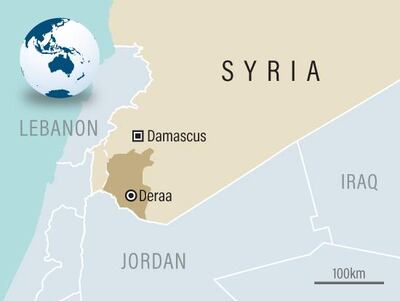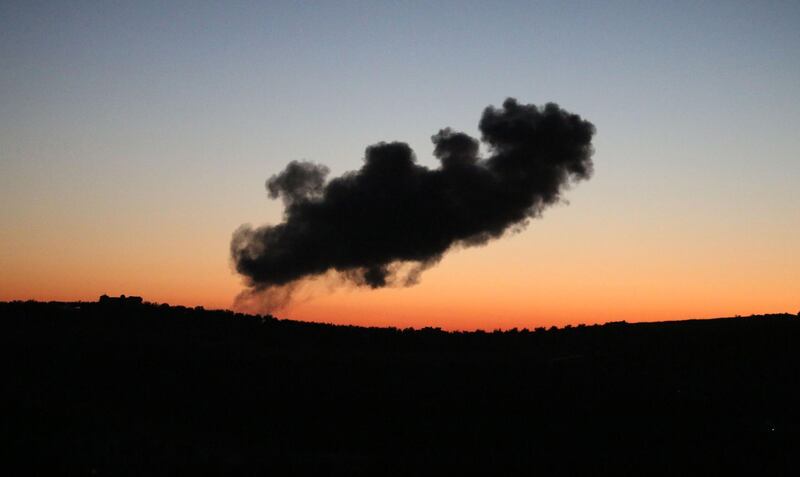Almost all of the estimated 60,000 civilians who fled to the Jordan border have returned to their homes in the two days since a ceasefire deal between government ally Russia and rebels ended more than two weeks of deadly bombardment in southern Syria, the United Nations said Sunday.
The ceasefire agreement was largely holding despite air strikes on two areas that killed four civilians, the Syrian Observatory for Human Rights monitoring group said, and although evacuations of rebel areas under the deal were postponed.
President Bashar Al Assad's government is determined to retake control of the key southern province of Deraa bordering Jordan and the Israeli-occupied Golan Heights, seven years after protests there sparked Syria's civil war.
Since June 19, bombardment of the province had forced more than 320,000 people from their homes, according to the UN, many fleeing to the sealed border with Jordan.
______________
Read more:
Thousands of Syrians head home after rebels agree to Deraa truce
Syrian rebels reach deal with Russia for weapons handover
______________
The UN humanitarian coordinator in Jordan, Anders Pederson, said most of the displaced along the Jordanian border had headed back inside Syria.
There are "around 150 to 200 people right now at the border", he said.
More than 60,000 people have since taken to the roads from the Jordanian frontier, heading back to their homes in the east or west of the province, the Britain-based Observatory said.
On Sunday, the returns were continuing, the Observatory said, even as regime warplanes attacked two areas in Deraa province.
On Friday, rebels and the government announced a ceasefire deal, providing for opposition fighters to hand over their heavy weapons and paving the way for a regime takeover of the province.
Three civilians were killed in air strikes on Um Al Mayazin, five kilometres north of the Jordanian border, said the Britain-based monitor.
Earlier, rebel fire on a government convoy travelling near Um Al Mayazin on the highway from the border had killed several soldiers, Observatory director Rami Abdel Rahman said, without providing a toll.
By Sunday afternoon, regime forces had taken control of the village, he and Syria's state news agency Sana said.
"The military incursion into Um Al Mayazin came after opposition fighters there rejected the agreement," Mr Abdel Rahman said.

A regime air strike on the rebel-held half of the provincial capital of Deraa killed one civilian, the Observatory said.
Clashes between both sides rocked the area between Deraa city and Um Al Mayazin.
On Saturday, several rebel factions put out a statement saying they did not accept the ceasefire deal and would continue fighting.
"The regime and the Russians consider themselves to have won and are acting accordingly, advancing and applying articles of the deal however they want," rebel spokesman Hussein Abazeed said.
On Friday, regime forces retook control of the Naseeb border crossing with Jordan.
Under the ceasefire deal, troops were to deploy along the frontier with Jordan, while rebels were to hand over their heavy weapons.
Opposition fighters were also given the option of being moved out to rebel-held areas in northern Syria.
But Mr Abazeed said the evacuation of opposition fighters and their families planned for Sunday was temporarily put on hold due to "an exchange of fire".
"A hundred buses were supposed to arrive but [the operation] has been postponed to a later date," the rebel spokesman said.
An ISIS affiliate, which holds a small pocket in the southwest of Deraa, is excluded from the ceasefire deal.
The assault on rebel-held areas in Deraa since June 19 had killed more than 160 civilians, the Observatory claimed.
Since Russia intervened on Mr Al Assad's side in Syria's conflict in 2015, the Syrian government has notched up a series of victories against rebels and extremist groups in the country.
Government forces, which secured the capital Damascus earlier this year, now control more than 60 per cent of the country, according to the Observatory.
The deal between rebels and Russia announced for Deraa is the latest in a string of such accords to see Damascus regain control of rebel-held areas.
These often come after blistering military offensives or crippling sieges, which effectively force the rebels into the so-called "reconciliation" deals.
Syria's war has killed 350,000 people and displaced millions of others since it started with the repression of anti-Assad protests in 2011.
Jordan says it has taken in around 1.3 million refugees and will not open its border to any more.
Meanwhile in Lebanon, which hosts just under 1 million registered Syrian refugees, Hezbollah pressed ahead with plans to open centres to allow voluntary returns. The non-state sanctioned move comes after months of increasing rhetoric from some political parties in the country keen to see refugees return to so-called safe zones. The UN has repeatedly pointed out that there are numerous reasons for refugees to remain outside the country and as such will not work to return Syrians to their country although it would assist those who wish to go.
Hezbollah affiliated Al Akbar newspaper reported over the weekend that the Iranian backed group would gather information on refugees in Lebanon to be shared with the Syrian regime. The information would include those wanted for deserting the army or escaping conscription and military service. It also added that the Free Patriotic Movement would be conducting similar Syrian refugee outreach to Hezbollah in an effort to encourage more to begin returning home. Gebran Bassil, caretaker foreign minister and head of the FPM, has been a vocal critic of UNHCR over its reluctance to return refugees.
About 500 refugees living in south Lebanon's Shebaa Farms area returned home earlier this year and more than 3,000 registered to return home from the country's north-eastern town of Arsal, with around 300 having departed.





